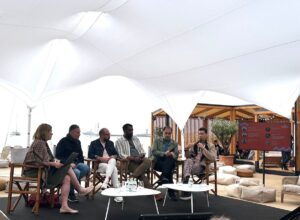
- ARAB NEWS
- 02 Jul 2025

CANNES: Arab regional cinema has not only been around for decades but has attained international acclaim for local productions.
At the 76th Cannes Film Festival, the Middle East and North Africa 360 panel explored ways of accessing the largest untapped market in the world through various panel discussions centering on production, locations and talent.
As the region continues to invest in financing films locally and with a larger audience thirsting for authentic stories, the stories have become more specific, nodding less to what Europeans and Americans want to see on screen and more toward Arab viewers consuming content.
“Because I’m interested in Middle East and Arab cinema, and have been distributing for 20 years, I really felt something growing…There are a lot more directors and producers, and it will only develop more,” said Michel Zana, head of French company Dulac Productions and Distribution.

The region is experiencing the evolution of a positive ecosystem, opening up more opportunities for interaction with the international film industry.
In Saudi Arabia, AlUla and NEOM have served as a home for Hollywood film productions, most recently “Kandahar” and “Desert Warrior” in NEOM, with the mega-project’s plans to have an in-state media hub covering 1 million sq m, including 50 sound stages and studios, tenancy space for the industry to be located, and the establishment of learning facilities.
“At the heart of it, we’re trying to create a true regional hub for content there. It’s a market that’s under-served by any measure or metric,” said Wayne Borg, head of film at NEOM.
Rasha Al-Emam, founder and CEO of Yellow Camel, Saudi Arabia, said: “Now that everything is opening up and you have the support of entities like NEOM and the film commission, a lot of stories haven’t been told yet. There’s so much that we’d like the world to see and hear about, and it’s just going to get bigger and bigger, and not just comedy, but real stories that reflect our culture.
“We aim to become the No. 1 hub for film in the world, so that’s why we’re saying it’s not just a desert. We can build London in the backlot if you want.”
Reflecting on the Royal Film Commission — Jordan’s 20th anniversary, its managing director Mohannad Al-Bakri explained that it had taken on the role of learning institutions and film universities, which are lacking in the country, to work with locals on developing their technical and creative talent.
“If we look at the film industry in Jordan, the past six or seven years, our own original creation of stories is becoming very popular in cinemas and festivals around the world, because of the investment in talents through training programs we provided,” Al-Bakri said.
Sudan, similarly, never had prominent backing for such initiatives and was unsupported by its government. The country had reached a point where cinema ventures were not shunned, but only time will tell how things will develop after the war.
“Sudan is a land of untold stories,” said Amjad Abu Alala, producer of the films ‘Goodbye Julia’ and ‘Moon Knight.’
“We have a lot of unseen faces,” he said.